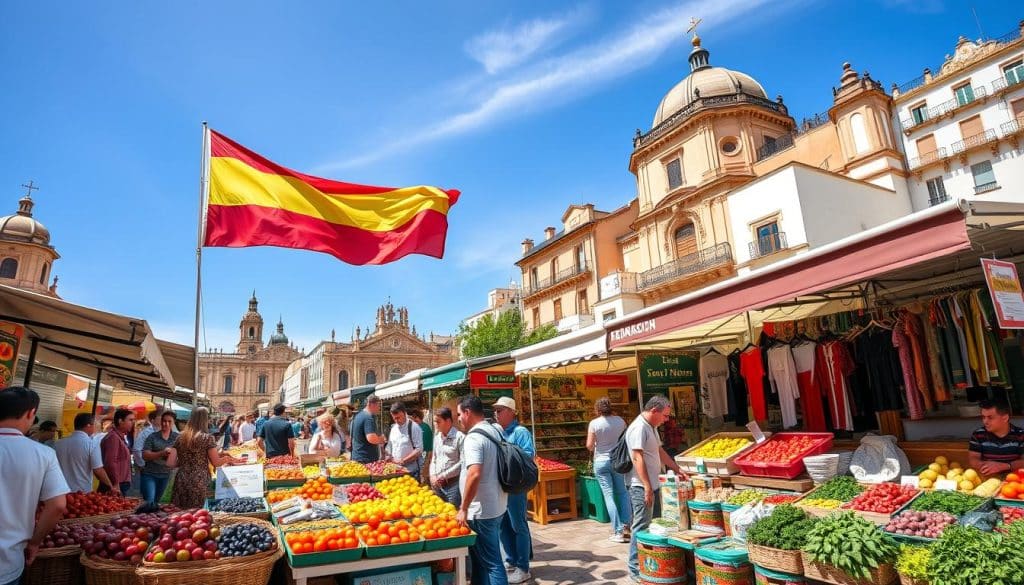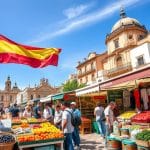Spain’s economy is the fourth largest in the Eurozone. It generates a whopping €1.2 trillion every year. This highlights the Spanish market’s richness, with various key sectors offering many trade chances for investors and businesses.
We’re going to look closely at the industries driving Spain’s economy. We aim to see how these sectors boost the economy and spot opportunities for collaboration, investment, and growth. Understanding the dynamics of key industries helps us see the bright prospects in this lively market.
The Economic Landscape of Spain
Looking at Spain’s economic picture, we see a nation full of variety and promise. Its economy reflects many sectors adding a lot to the country’s GDP. According to the World Bank, Spain has been recovering steadily from previous hurdles. The latest figures show a positive growth rate, showing Spain’s strength and flexibility.
Several key sectors like tourism, manufacturing, and technology contribute to GDP. Each plays a vital role in Spain’s economic scenario. Let’s discuss a few important parts:
- Tourism, a vital driver of revenue and employment.
- Manufacturing, which includes automotive and textile industries.
- Technology, where we see a growing emphasis on innovation and digitalisation.
Looking into GDP Contributions, the Spanish Institute of Statistics shares important earnings data. The European Commission’s policies aim for sustainable growth, supporting Spain’s economic health. Keeping an eye on these changes, Spain’s economic scene offers great chances for growth and investing.
Key Sectors in the Spanish Market
The Spanish economy benefits greatly from a few key industries. Manufacturing, technology, agriculture, and tourism stand out. They play a big part in the nation’s economic health. They show us how these areas lift up communities and guide economic trends.
Overview of Economic Contributions
Here’s a quick look at what these sectors bring to the table:
- Manufacturing: It’s all about being creative and competitive. This sector is a big deal for exports and making jobs.
- Technology: With more digital stuff happening, this area is boosting efficiency and opening new doors.
- Agriculture: This isn’t just about food. It’s key for helping rural areas grow and for eco-friendly efforts.
- Tourism: It adds a lot to the economy by creating jobs and allowing for cultural exchanges.
Trends Impacting Sector Growth
Several trends are changing how these key sectors perform. Here are the main ones:
- Digital Transformation: Businesses are getting better with tech to meet what people want.
- Changes in Consumer Behaviour: People care more about the planet, and it shows in what they buy.
- Sustainability Initiatives: Going green is a must for staying competitive and growing in the future.
A Deep Dive into Technology and Innovation
The Technology Sector in Spain is leading the country’s economic growth. Innovation and a rise in startups are changing old industries. This has led to big improvements in finance, healthcare, and travel. We see these areas adopting digital ways to meet today’s needs better.
Startups are key to the Technology Sector’s expansion. The Spanish Association of Startups says these new businesses boost creativity and competition. They are essential for making Spain a tech leader in Europe. Their fresh ideas and quick responses help solve industry problems.
Research and development (R&D) is vital for encouraging innovation. Companies in various sectors invest in R&D to stay ahead as things rapidly change. The government, through initiatives highlighted by the Spanish Agency for International Development Cooperation, supports tech innovation. This support helps businesses to try new technologies and improve their operations, which leads to steady growth.
Digital Transformation is critical for old companies to stay in the game. Consulting firms like McKinsey stress the need for these companies to use new tech. This helps them meet consumer expectations and work more efficiently. This ongoing change drives the economy forward, showing the important link between Technology, Innovation, and Digital Transformation for success in the future.
The Role of Tourism in Economic Development
Tourism greatly aids Spain’s economic growth, boosting jobs and the GDP. It brings in a network of opportunities, helping local economies grow.
Tourism Statistics and Growth
Spain sees a huge economic lift from its tourism sector. Data from the Spanish Tourism Institute shows millions visit annually, bringing in money. This helps local shops and secures thousands of jobs, showing tourism’s key role in economic health.
Sustainable Tourism Practices
Sustainable tourism is getting more popular as travellers change their habits. We’re seeing a move to green efforts that take the planet into account. Cities and regions are now focusing on travel that’s good for both people and nature, per recent University of Barcelona studies.
Spanish Agriculture: A Vital Component
Spain’s agriculture is essential to our economy and culture. It produces many foods for local and global buyers. Olive oil, wine, and fresh foods are among our offerings. These make Spain a top agricultural exporter in Europe.
The sector faces issues, though. Climate change impacts our traditional farming. Water scarcity is another big challenge. We must look at new practices and technologies to overcome these problems.
Being part of the EU’s Common Agricultural Policy shows our dedication. This initiative aids in keeping our agriculture strong and sustainable. It lets us produce and share high-quality food with the world.
The Influence of Renewable Energy
Spain is a leading country in Renewable Energy, focusing on wind and solar power. Our goal to support Sustainable Development helps lower carbon emissions and move to cleaner energy. We look at the important contributors and the strong government efforts backing this key industry.
Key Players in the Renewable Sector
Several key companies drive our renewable energy sector. Notable ones include:
- Iberdrola – A top force in wind energy.
- Acciona – Known for producing solar energy.
- Siemens Gamesa – Specialises in onshore and offshore wind solutions.
Investing in these companies shows growing belief in Renewable Energy. It boosts our standing in Europe and worldwide.
Government Initiatives and Policies
Spain’s government is committed to clean energy with several actions. Major policies are:
- Encouraging solar panels on homes and businesses.
- Backing research and development in renewable technology.
- Meeting European Union renewable energy targets.
These efforts not just aim for a sustainable future. They also grow our economy in the Energy Sector.
Understanding the Property Market
The Property Market in Spain is doing really well now. It’s seeing some strong trends that draw in investors from all over. In places people love to visit, like Barcelona and Madrid, we’re seeing more buying and selling of homes and shops. These popular spots keep attracting buyers from around the world.
What’s making property prices go up? Well, a lot of people from other countries want to live in Spain for its sunny weather and fun lifestyle. Plus, the economy is getting better, making people more willing to buy.
- Foreign investment creating a competitive environment.
- Tourist hotspots leading to increased demand for properties.
- Regulatory changes affecting property transactions.
- Insights from Spanish Property Registrars indicating a growing market.
If you’re in the UK and thinking about investing in Spain, there’s plenty of chances to find a good deal. But it’s important to know about the rules for buying property there. Looking at what experts in real estate say can help you understand what to expect.
Overall, Spain’s Property Market is full of chances to find something great. Keeping up with the latest trends and rules can help us make smart choices in this busy market.
The Impact of Retail and E-commerce
In recent years, the retail world in Spain has changed a lot. This is mostly because of the fast growth of e-commerce. This growth changes the way we shop. Now, companies are moving towards digital. They’re combining traditional shopping with online shopping. This mix provides a smooth shopping experience which suits today’s shopper.
The COVID-19 pandemic made these changes happen faster. A big jump in online shopping was seen. So, retailers had to improve their digital game. Reports from The Spanish Retail Association show how stores adapted. They offered more online shopping choices. This shows their strong will and creativity during tough times.
Big e-commerce names are now big players in retail. Research by Nielsen explains how these brands are changing what we buy. There’s a shift in how we spend our money. Traditional shops need to use e-commerce growth to their advantage. It’s important for them to keep up with what customers want. This will help them stay in the game in this lively market.














